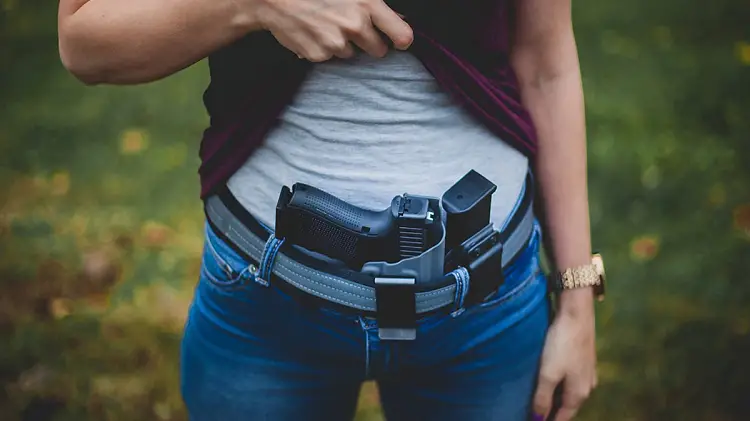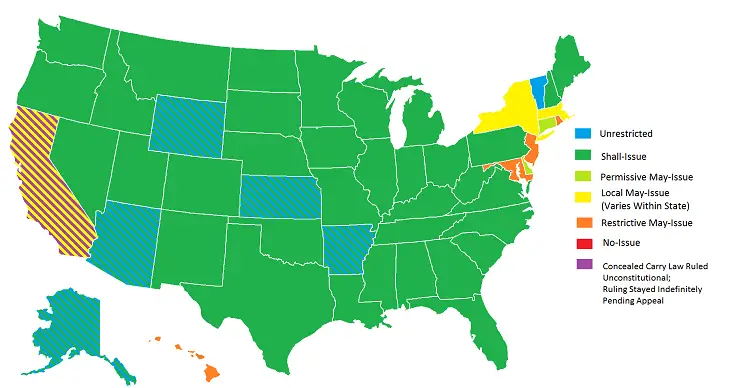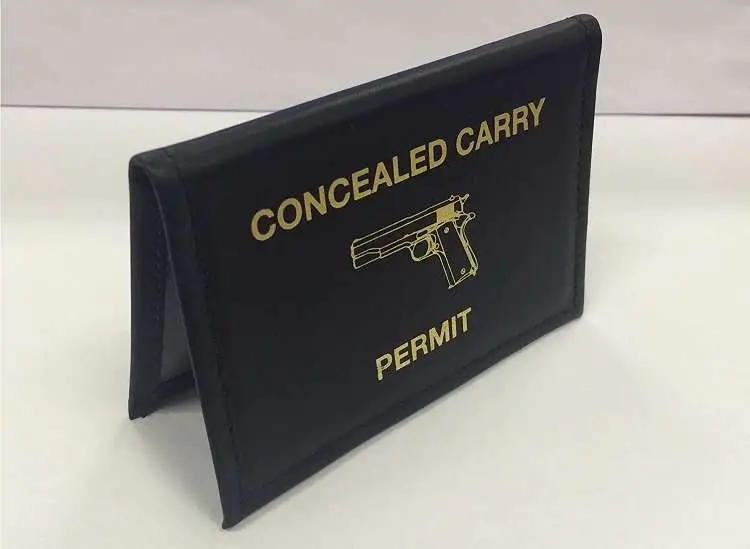In the United States, concealed carry guns have been used to thwart robberies and save lives.
Their carriers are people just like you and me, who want to defend themselves and their families in threatening or hostile situations.
You can’t just carry a gun in your back pocket and hope for the best—you have to come prepared with knowledge, experience, the best belly band holster (or the best-concealed carry purse), and the legal right to conceal your weapon.
Without a concealed carry permit or license, you’re looking at some serious fines or jail time.
Today, we’re here to crack open the subject matter of concealed carry and break down everything you need to know about it to prevent entangling yourself in a legal issue with your concealed carry firearm.
If you don’t have time to get a permit to carry or your State doesn’t allow guns, the best combat knife is another reliable weapon for self-defense.
Countrywide Rules You Can’t Avoid

Congress has stated some clear and concise federal laws that must be upheld.
These are not necessarily about your concealed carry, but they are relative to concealed carry, of which your state must define and enforce laws.
Just because you have a permit to carry a concealed firearm doesn’t make you invincible against legal ramifications. Keep these in mind when carrying your concealed firearm for good measure.
- Always have a valid form of photo identification on-hand when carrying a concealed weapon. This allows you to accurately identify yourself to police and federal agents should a situation arise.
- If your home state allows concealed carry, but the state you are driving through or visiting does not, you may not conceal your firearm while in that state. You must be conscious of all state laws that you will be visiting or traveling through.
- If you are an off-duty police officer, or you are retired, you may conceal carry a weapon and discharge it, when appropriate, within a school zone without facing the results of additional prohibitions.
Technically, there are no federal laws about concealed carry, just acts that pertain to them. They influence state-specific laws, which we’re about to get into in just a moment.
Concealed Carry Law by State

Every state has its own stipulations.
While gun laws can be complex, these are specifically concealed carry laws.
Find out if you, a resident or non-resident, can get a concealed carry permit in these states.
- Alabama: Resident permits only. Must be 18 or older to apply for a permit.
- Alaska: Resident permits only. Must be 21 or older to apply for a permit.
- Arizona: Resident and non-resident permits. Must be 18 or older to apply.
- Arkansas: Resident permits only. Must be 21 or older to apply for a permit.
- California: Resident permits only. Must be 21 or older to apply for a permit.
- Colorado: Resident permits only. Must be 21 or older to apply for a permit.
- Connecticut: Resident and non-resident permits. Must be 21 or older to apply.
- Delaware: May issue to residents, no guarantee. Must be 18 or older to apply.
- Florida: Resident and non-resident permits. Must be 21 or older to apply.
- Georgia: Resident permits only. Must be 21 or older, or 18 if military personnel.
- Hawaii: Resident permits only. Must be 21 or older to apply.
- Idaho: Resident and non-resident permits. Must be 21 or older to apply.
- Illinois: Resident and non-resident permits. Must be 21 or older to apply.
- Indiana: Resident and non-resident permits. Must be 21 or older to apply.
- Iowa: Resident, limited bases for non-residents. Must be 18 or older to apply.
- Kansas: Resident and active duty military. Must be 18 or older to apply.
- Kentucky: Resident and non-resident permits. Must be 21 or older to apply.
- Louisiana: Resident and active duty military permits. Must be 21 or older.
- Maine: Resident and non-resident permits. Must be 18 or older to apply.
- Maryland: Resident and non-resident permits. Must be 21 or older to apply.
- Massachusetts: Resident and non-resident permits. Must be 21 or older to apply.
- Michigan: Resident and active duty military. Must be 21 or older to apply.
- Minnesota: Resident and non-resident permits. Must be 21 or older to apply.
- Mississippi: Resident and non-resident permits. Must be 21 or older to apply.
- Missouri: Resident and military non-resident permits. Must be 19 or older.
- Montana: Resident permits only. Must be 18 or older to apply.
- Nebraska: Resident and military non-resident permits. Must be 18 or older.
- Nevada: Resident and non-resident permits. Must be 18 or older to apply.
- New Hampshire: Resident and non-resident permits. Must be 18 or older.
- New Jersey: Resident and non-resident permits. Must be 18 or older to apply.
- New Mexico: Resident and non-resident permits. Must be 21 or older to apply.
- New York: Resident and part-time resident permits. Must be 21 or older to apply.
- North Caroline: Resident and military non-resident permits. Must be 21 to older.
- North Dakota: Resident and non-resident permits. Must be 18 or older to apply.
- Ohio: Resident and non-resident Ohio worker permits. Must be 21 or older.
- Oklahoma: Resident and military non-resident permits. Must be 21 or older.
- Oregon: Resident and specialized non-resident permits. Must be 21 or older.
- Pennsylvania: Resident and non-resident
- Rhode Island: Resident and CCW-holding non-residents. Must be 21 or older.
- South Carolina: Resident and non-resident permits. Must be 21 or older to apply.
- South Dakota: Resident and military non-resident permits. Must be 21 or older.
- Tennessee: Resident and military non-resident permits. Must be 21 or older.
- Texas: Resident and non-resident permits. Must be 21 or older to apply.
- Utah: Resident and non-resident permits. Must be 18 or older to apply.
- Vermont: No permit required. Must be 18 or older to carry (federal law).
- Virginia: Resident and non-resident permits. Must be 21 or older to apply.
- Washington: Resident and non-resident permits. Must be 21 or older to apply.
- West Virginia: Resident and permanent post-military non-resident permits. Must be 18.
- Wisconsin: Resident and military non-resident permits. Must be 21 or older to apply.
- Wyoming: Resident permits only. Must be 21 or older to apply.
Note: Military non-resident permits also apply to spouses living in the state with their active-duty military spouse at the time.
How To Obtain A Concealed Carry Permit

Do you remember the process of getting the right to even own/fire a gun? It’s sort of similar to that.
Since concealed carry permits are usually carried out by responsible gun owners, you’d think that the process—having already established you as a credible and responsible gun owner when you got your firearm license—would be fairly simple.
If only that were the case.
Let’s use the state of North Carolina as an example for this section. It’s a good set of laws and expectations to use as a basis.
In North Carolina, you must do the following to acquire a concealed carry permit:
- Two hours of Legal Issues training.
- Handgun fundamentals and reloading explanations.
- Maintenance and cleaning.
- Handgun nomenclature (understanding parts of your handgun).
- Gun presentation.
- Marksmanship training.
- Handgun safety.
- Target practice (21/30 successful target hits).
A Smarter Way To Conceal Carry Your Sidearms
Whether it’s in restaurants, national parks, campuses, or anywhere in between, it’s important to know what you’re getting into with concealed carry.
In many cases, these can be more difficult rules to remember than with open carry.
Understand federal and local laws regarding concealed carry, and understand your duty to inform law officials when you have a concealed weapon when the situation is appropriate.
Aside from practicing to be an accurate shooter, you must know how to defend yourself. Training on martial arts will serve as your backup in case your gun gets swiped out of your hands.
Here are helpful resources about choosing a concealed carry holster and knowing which types of gun holsters are right for you.
Looking for a martial arts school where you can enroll the whole family? Or just want an introduction to self-defense? You can find all the best self-defense blogs in this article
